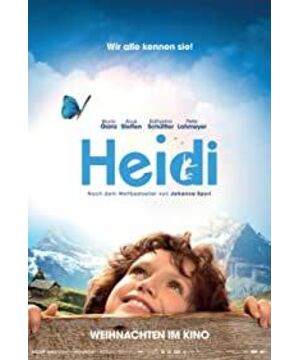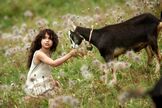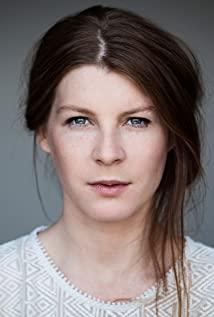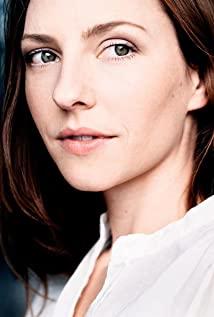Perhaps adapted from the original novel with beautiful words, watching the opening fragment of "Heidi and Grandpa" is like reciting a prose poem full of childlike innocence. In the oil painting-like natural scenery of the Alps and the quiet and peaceful life of the grandfather and grandson, the little girl's growth story unfolds quietly. The pure and lively Heidi jumps and runs between the green grass and wild flowers in the mountains. In the distance, there are lush virgin forests and white snow-capped mountains. The pictures are intoxicatingly beautiful. With light music, the viewer is quickly guided. Immerse yourself in it.
Of course, there is no story, no matter how beautiful the scenery is. If the film stops there, it's just some beautiful scenery shots, and it's easy to indulge in lyricism. The original author, Johanna Spyley, draws from her own experience, infusing the Alpine landscape with story and soul.
From the initial hints and foreshadowing, Heidi's fate has become a dark background behind the scenery. Her parents died early, her life was cramped, and she was abandoned by her aunt who had an equally rough fate. Sold to a noble family and become the playmate of a disabled girl in a wealthy family.
However, Heidi faced everything that life gave with her optimism, positivity and kindness, and let the warmth and kindness shine into the inner world of the adults around her like sunshine. Not only was he accepted and loved by his grandfather, but he also gained a pure friendship with the sheep-herding boy Peter. The tacit understanding and friendship among the children are similar to Wang Zengqi's "Precept", while the concern and love under the indifferent expression of the grandfather, as well as in Heidi's love The moving process of unwinding one's guard during the infection also makes people look forward to the girl's fate.
Although the rhythm is slow, director Gerspenner demonstrates his skillful narrative skills and ability to control, and the conflict between adults has been running through the whole film, becoming a looming important clue. And when Heidi walked into a noble family, the core conflict that the film wanted to express began to appear. The girl's frank and simple mountain temperament eventually had to collide violently with modern civilization and the rigid and hypocritical upper-class life. In the face of the cold and rigid class concept in the adult world, the strength of children is also tough and strong.
This film sparked a higher level of speculation. A lively and free soul and a well-behaved civilization, the natural warmth of the same kind, and the closed and cold class gap, how to eliminate the differences between these opposing elements? And whether they have the possibility of harmony and unity? The story does not attempt to answer these questions directly. Too blunt conclusions can also affect the integrity of the work.
Following the writer's ideas, the director still adopted literary romantic expressions to advance the story. Despite all kinds of contradictions and twists and turns, the instinctive pity and empathy awakened the conscience of aristocratic adults. The vivid soul continues to stretch freely in the mountains. Under the gentle guidance, the girl understands the importance of knowledge and stories while getting close to the wild nature. She picks up paper and pen and starts to write her own story. At the same time, the noble lady also sensed the dynamism and distance of the vast world between the mountains and the Cangyuan, and gained strength from nature, miraculously restored the ability to walk.
This is obviously an idealized happy ending. It ignores the stubbornness of human consciousness and class society, and also beautifies the roughness and barrenness of mountain life and the power of modern civilization. Real life is far more complicated and complicated than literary imagination. Deep, it is difficult for individuals to be independent and powerful completely ignoring reality. However, we still need Heidi’s story to remind the world of the importance of innocence and kindness. Children are so optimistic and tenacious. Even if things are difficult and the road ahead is bumpy, we should have a good heart and a smile on our faces. Actively confront, toward the ideal path of the warm sunshine, continue to work hard to get closer.
View more about Heidi reviews










